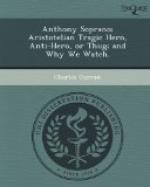|
This section contains 984 words (approx. 4 pages at 300 words per page) |

|
Faustus: the Aristotelian Hero That Was Not
Summary: Explains why Doctor Faustus is considered an Aristotelian hero. Discusses Aristotle's definition of a tragic hero, including a definition of the tragic flaw hamartia.
Heroes are often thought to be noble persons who are brave and stick up for the "little" man, however, there is another kind of hero known as Aristotelian hero. According to Aristotle, a tragic hero is one who posses a tragic flaw known as hamartia. Hamartia is a fatal error or flaw, which in the end causes the hero's downfall. Aristotelian heroes are supposed to become enlightened at the end of the story, however Faustus does not become enlighten at the end of the story. Faustus does however, resemble an Aristotelian hero in that he is a regular man who yearns to know all, and thus possesses a hamartia, which in the end causes his downfall.
Faustus was a man who like many was born ."..of stock..." but he worked hard and raised his social status (Chorus, 1). While sitting in his study, Faustus is anxious to find a...
|
This section contains 984 words (approx. 4 pages at 300 words per page) |

|


